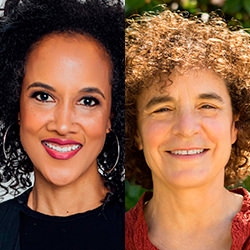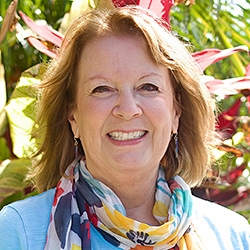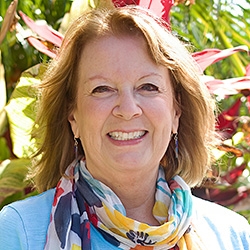
Search Results: power
-
Someone may give more weight to your ideas, decisions, and directives based on your experience and what you've learned. This could influence them to project their ideals, fears, hopes, and more onto you. In this case, you can help transform this and contribute to their connection to their own agency, authenticity, and self-trust -- while supporting their ability to learn from what you have to offer.
-
Even in a conflict, you can offer emotional safety without being enmeshed -- and you can do this without sliding into strategies to gain power over another. You can prioritize connection, express your intention, make space for mutuality, honestly reveal what you care about and propose a way forward. This means caring for your needs regardless of their response -- and mourning if their response isn't what you want. Read on for more.
-
In this session of Miki Kashtan's 4 session course titled Leadership Within Your Workplace she shares how most of us believe we are powerless at work – even if we’re the one “in charge.” This session offers you the opportunity to learn how to consciously change this mindset, and have a positive impact on workplace culture and attitudes along the way. Most of us believe we are powerless at work – even if we’re the one “in charge.”
-
- Uncover the expansive possibilities of Nonviolent Communication in growing compassion for a more empathic world
- Engage with 17 global trainers on 17+ unique topics
- Connect with an international audience from novices to experts
- Immerse yourself in a festival of learning, fun, and community
-
Aya Caspi delves into the impact of societal structures and parenting approaches on individuals, particularly the prevalence of extrinsic motivation rooted in fear of punishment, desire for rewards, and a sense of obligation. The emphasis is on how these dynamics contribute to collective trauma and affect brain development. Examples, such as Hitler's childhood and the adverse effects of the educational system, are used to illustrate the consequences of such practices. Aya advocates for systemic change in these structures and emphasizes the role of non-judgmental practices in potentially reducing adult depression. The discussion highlights the importance of empathy and challenges the traditional methods that may lead to emotional neglect and trauma, emphasizing the potential benefits of embracing non-judgmental approaches in parenting and societal frameworks.
-
Taking 100% Responsibility offers a powerful antidote to the all-too-common dynamic of blaming that leaves you in the victim position and unable to have the relationship you want. Miki invites you to assume a stance of leadership while holding full care for both parties’ needs. No longer will you need to wait for the other person to change, nor will you need to give up your needs to reach harmony.
-
What is empowered speech and how does it link to interdependence? How do you speak in a way that increases the chances of being heard and creates space where individuals are more inclined to listen and act? In this excerpt from the 2021 course, Working Together for Change, Itzel and Kathy explore how to do this by integrating empowered speech, attuned speech, and a commitment to maintaining connections.
-
Want to expand your needs vocabulary, and build your capacity to identify needs — even when you’ve been triggered? Check out Mary’s powerful teaching on Self-Empathy.
-
Join CNVC Certified Trainer Arnina Kashtan as explores interdependence, autonomy, valuing self and others, and power-sharing in your relationships. Free yourself to honor your longing for community, belonging, and love.
-
The human needs that we all share are the foundation of the Nonviolent Communication (NVC) process because it is in connecting to needs that we find inner freedom, empowerment and compassion.
-
When an entity or system has authority or power and mandates something we don't agree with we may submit or to rebel. If we submit, we give in or give up, often out of fear. If we rebel, we're in reactivity which may not help our cause, and reduce our power. This may result in others' resentment, anger, and pain. Gandhi and Martin Luther King didn't submit nor rebel. Instead, they were in choice and advocated for their cause.
-
Listen to Roxy Manning explore the barriers to speaking authentically as powerful voices for change, and practice these needed conversations about the ongoing violence in the streets of America.
-

What are the most powerful things I can do to build an inspired relationship? I answered the question with romantic relationships in mind; however, I believe the answer below applies to all important relationships.
-
This chart is intended as an aid to translating words that are often confused with feelings. These words imply that someone is doing something to you and generally connote wrongness or blame. To use this list, when somebody says “I’m feeling rejected,” you might translate this as: “Are you feeling scared because you have a need for inclusion?”
-
In this audio recording, Miki demonstrates how to stay in a dialogue when you don't trust someone's "yes," how to equalize power between people and how to allow space for others to say "no" to our requests.
-
This anecdote illustrates how a young man had the social awareness to consider how male conditioning may bring up competitiveness in his interactions with another man. The young man offered transparency and checked for consent in a way that shows an embodiment of power-with, togetherness, consideration, care, collaboration... and all without displaying any formal NVC training, and without looking to impress.
-
When we have few external resources (money, time, health connections, etc), we can still empower ourselves and one another. We can strengthen our internal resources, inspire people to join our cause, build solidarity, and influence others who have external resources to support us and our causes.
-
- Explore the complexities of how we can care for all of life using NVC
- See the role that power plays in relation to observations, feelings, needs, and requests
- Learn how to support people from many backgrounds in being able to apply NVC
- Discern how to engage with these vast topics as we learn and share NVC
-
Whether we have more or less power and privilege, anything without liberation for all is within patriarchal separation, and will continue cycles of oppression. To liberate ourselves and one another we need to increase our collective capacity through developing related knowledge, skills, research; build an understanding of patriarchal roots; confront lovingly; co-hold dilemmas about privilege; co-shape outcomes; etc.
-
Trainer Tip: When looking for a solution take the time to consider and connect to other's needs rather than just focusing on getting what you want. Such a basic shift in consciousness can make a profound difference in your relationships, both personal and professional. Notice how you feel afterward.


















